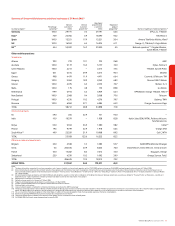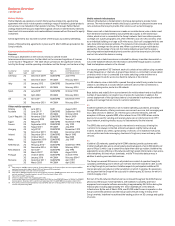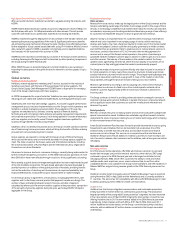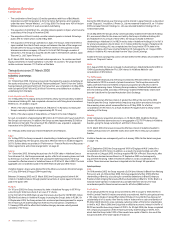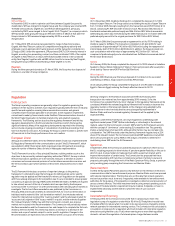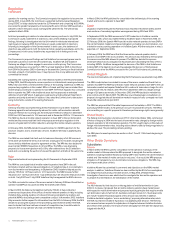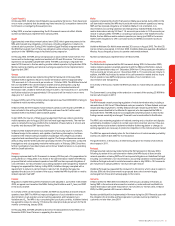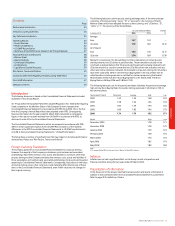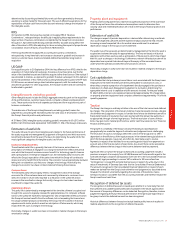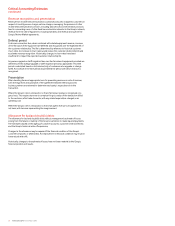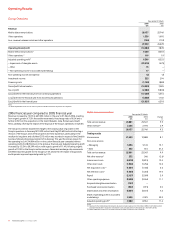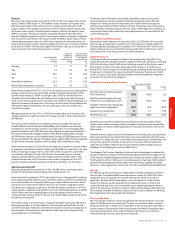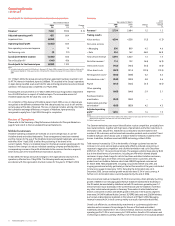Vodafone 2006 Annual Report Download - page 24
Download and view the complete annual report
Please find page 24 of the 2006 Vodafone annual report below. You can navigate through the pages in the report by either clicking on the pages listed below, or by using the keyword search tool below to find specific information within the annual report.22 Vodafone Group Plc Annual Report 2006
Regulation
continued
operators for roaming services. The Commission expects the regulation to become law
during 2007. In July 2005, the Commission, supported by the European Regulation
Group (“ERG”), a body established under the EU Framework and comprising all EU NRA’s,
also called for greater transparency of roaming tariffs and in October 2005 launched a
website to inform the public about roaming tariffs within the EU. The website was
updated in March 2006.
Anti-trust proceedings in relation to international roaming continue. In July 2004, the
Commission issued a statement of objections, a document detailing its proposed
findings, following its investigation into the UK market for wholesale international
roaming and, in January 2005, the Commission issued a statement of objections
following its investigation of the German market. In both cases, the statement of
objections was addressed to both the national mobile operating subsidiaries and to the
Company and, in both cases, Vodafone has responded both in writing and in oral
proceedings.
The Commission’s proposed findings are that Vodafone has monopoly power over its
wholesale customers in both the UK and Germany. Vodafone UK and Vodafone
Germany are alleged to have engaged in excessive or unfair pricing. The Commission
alleges that the abuse occurred from 1997 to at least September 2003 in the UK and
from 2000 to December 2003 in Germany. In the event the Commission finds that there
has been a breach of competition law, it may impose a fine on any addressee who had
committed the breach.
Separately, the roaming market is one of the relevant markets in the Recommendation.
In May 2005, the ERG adopted a common position on international roaming and several
NRAs have since then commenced their reviews of the roaming market but no NRA has
proposed any regulation in this market. NRAs in Finland and Italy have concluded their
market analysis and found no operator to have SMP. The French regulator has concluded
that no operator has SMP in the traditional sense but has proposed an extended
definition of joint SMP which, if approved, could lead to a finding that all three French
operators are jointly dominant. In addition, it has asked the Commission to take action
using instruments outside of the existing Framework.
Germany
Germany enacted a law implementing the EU Framework in June 2004. Vodafone
Germany agreed to and subsequently reduced its mobile call termination rate with
Deutsche Telekom for incoming calls from Deutsche Telekom’s network in December
2004 from14.32 eurocents to 13.2 eurocents and in December 2005 to 11.0 eurocents.
The NRA has found all mobile network operators to have SMP in the call termination
market and has announced that it will now propose ex-ante price regulation in the
absence of agreement to further reductions amongst the mobile network operators.
In February 2004, the NRA decided to award licences for 450MHz spectrum for the
provision of public access mobile radio services. Vodafone Germany is appealing this
decision.
The NRA has concluded that it will seek to harmonise the expiry of all 2G licences in
2016 and it will extend the terms of all licences ceasing prior to this date, including the
licence held by Vodafone subject to agreement on fees. The NRA has also decided to
award certain 900MHz frequencies to O2 and EPlus. The NRA is now developing
proposals to license new spectrum at 2.6 GHz, often referred to as the 3G extension
band, and is considering the auction of unused 3G spectrum at 2 GHz at the same time.
Italy
Italy enacted national law implementing the EU Framework in September 2003.
The NRA has concluded that all mobile network operators have SMP in the call
termination market and has imposed obligations on Vodafone Italy of cost orientation,
non-discrimination and transparency. In September 2005, Vodafone Italy reduced its
rates by 19% from 14.95 eurocents to 12.10 eurocents. The NRA foresees further
reductions to 11.20 eurocents from 1 July 2006 and by 13% below the retail prices index
on both 1 July 2007 and 1 July 2008. Vodafone Italy has appealed the NRA’s decision.
The NRA concluded its review of the access market in February 2006 and found that no
operator had SMP but has said it will keep the market under review.
In March 2005, the National Competition Authority (“NCA”) in Italy conducted
unannounced inspections of the offices of mobile network operators in Italy, including
Vodafone Italy, seeking evidence of collusion following complaints by resellers and
potential MVNOs about alleged anti-competitive conduct. In November 2005, Vodafone
Italy received a further request for information from the NCA. In February 2006, the NCA
decided to prolong the duration of the proceeding until December 2006. If the NCA
were to decide that there had been a breach of competition law, it would be able to
impose a fine on any operator who had committed the breach.
In March 2006, the NRA published for consultation the draft analysis of the roaming
market and found no operator to have SMP.
Spain
Legislation implementing the EU Framework was enacted in November 2003, and the
main sections of secondary legislation were approved during 2004 and 2005.
In September 2005, the NRA announced a 10.57% reduction in Vodafone’s mobile
termination rates, which was implemented by Vodafone Spain in November 2005. On
23 February 2006, the Spanish NRA found all mobile network operators to have SMP in
the call termination market and imposed obligations including non-discrimination, cost
orientation and accounting separation on Vodafone Spain. A further reduction in rates is
expected on 1 September 2006.
In February 2006, the NRA found that the three mobile network operators held a
position of joint SMP in the access markets. This decision was reviewed by the European
Commission and the NRA allowed to proceed. The NRA has decided to impose a
wholesale network access obligation at reasonable prices facilitating the entry of firms
including MVNOs. Vodafone has appealed the decision of the NRA to find Vodafone as
holding SMP in the Spanish courts and has appealed the decision of the European
Commission to allow the NRA to proceed to the Court of First Instance at Luxembourg.
United Kingdom
The new Communications Act, implementing the EU Framework, was enacted in July 2003.
The NRA conducted and concluded its review of the access market and found that no
operator had SMP. The NRA found that all mobile network operators have SMP in the call
termination market and required Vodafone UK to reduce its termination charge for calls
conveyed over the 2G network, with effect from September 2004, to a target average
charge of 5.6 pence per minute. In December 2005, the NRA decided to maintain this
price control until 31 March 2007. The NRA has now embarked upon consultation on
proposals to regulate the call termination market in respect of calls conveyed over both
2G and 3G networks from April 2007.
The NRA has proposed that 2G mobile frequencies will be tradable in 2007. The NRA is
assessing whether holders of 2G spectrum can use it to provide 3G services. The NRA is
also consulting on a specific proposal to liberalise spectrum usage rights more generally.
United States
The Federal Communications Commission (“FCC”), the United States’ NRA, commenced
a Notice of Inquiry in 2004 into the level of termination rates charged by foreign mobile
network operators to US international operators. The FCC sought inputs on the status of
foreign mobile termination rates, including actions taken to date by foreign regulators to
address the issue. This proceeding remains pending.
The NRA plans to award spectrum via auction in the 1.7 and 2.1 GHz bands beginning in
June 2006.
Other Mobile Operations
Subsidiaries
Albania
In March 2006, the NRA issued for consultation to the operators its analysis of the
mobile market in Albania, where the NRA proposed to designate the mobile networks
operators including Vodafone Albania as having SMP in two markets: the call termination
market and “the market of mobile services to end users”. As a result, the NRA proposes
obligations of transparency, non-discrimination and access obligations. The NRA may
also impose retail price controls.
Vodafone Albania has submitted its comments and objections on the NRA’s market
analysis. In addition, Vodafone Albania has been notified by the NCA of an investigation
into alleged excessive pricing of mobile services. In May 2006, a Parliamentary
Investigation Commission was established to investigate the two mobile operators and
to prepare recommendations for liberalisation of the market.
Australia
The NCA released its final decision on the regulation of mobile termination in June
2004. In its review, it proposed that all mobile network operators have market power
with respect to mobile termination and proposed a pricing principle that requires mobile
call termination rates to fall from 21 Australian cents per minute to 12 Australian cents
per minute. Vodafone Australia’s appeal of this decision was rejected. In addition,
Vodafone Australia lodged an “access undertaking” proposing alternative rates, which
the NCA has rejected. Vodafone Australia is now appealing that decision. The NCA has
also received various requests for adjudication of disputes between Vodafone Australia
and certain other operators, the results of which will apply from the date the dispute was
lodged with the NCA.



